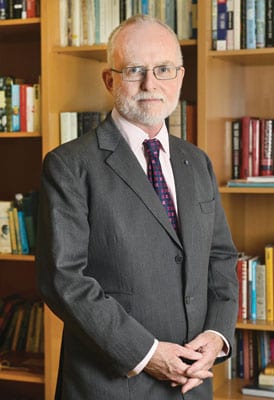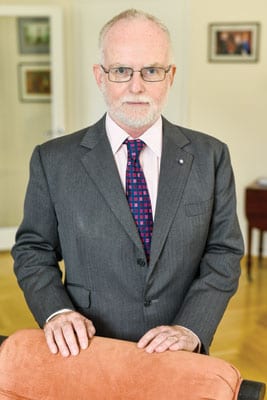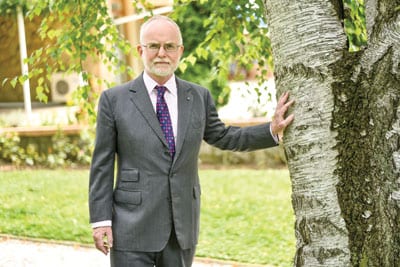The stability of the Western Balkans region is important for global stability and the stability of Europe as a whole. We all share the task of making sure that the horrors of the 1990s never happen again, says UK Ambassador Denis Keefe
In the build-up to the commemorating of the 180th anniversary of the establishing of diplomatic relations between the United Kingdom and Serbia (2018), British Ambassador Denis Keefe says that bilateral relations are strengthening and that a key interest of the UK is the stability of the region, which was also insisted upon by the Prince of Wales during his recent visit.
Commenting on the exchange of protest notes between Serbia and Croatia, Ambassador Keefe says that some statements made during August were “regrettable and unhelpful”, adding that regional stability depends on the ability of local leaders to turn to the future and to cooperation.
The fact that the UK will leave the European Union does not mean that it will withdraw from the region, insists Keefe, adding that “leaving the EU will give fresh impetus to our bilateral relationships on a broader level”.
Ambassador Keefe also says that Serbia can count on support for the comprehensive and ambitious plan of the government for the period ahead, which Prime Minister Aleksandar Vucic spoke about in his inauguration address, adding that he was “particularly interested to hear more about the economic reform agenda. And a recognition that Serbia can still do more in regard to the rule of law, support to the work of the independent institutions, and the promotion of freedom of expression”.
Your Excellency, both Serbia and the UK recently gained new governments, while the UK also gained a new prime minister. What kind of relations do you expect between the two cabinets and what will be the bilateral priorities?
Our bilateral relations with Serbia are on an improving trend and I look forward to that continuing.

We’re seeing more and more senior visits in both directions – including the first visit of HRH Prince of Wales to Serbia since 1978 – and an increased volume and quality of contact between our businesses, academic, arts and culture communities. We are also witnessing enhanced levels of cooperation in important areas such as justice and home affairs, migration, the fight against extremism and organised crime, and defence etc.
Governments in both countries are now formed and they have important business to deal with. Serbian Prime Minister Vucic has presented a comprehensive and ambitious plan for the continuation of reform across key areas. I was particularly interested to hear more about the economic reform agenda. And a recognition that Serbia can still do more in regard to the rule of law, support to the work of independent institutions, and promotion of freedom of expression.
Many British scholars with deep knowledge of the Balkans claim that, after Brexit, the UK has neither a political nor an economic interest in the region. How do you see the future of the UK’s business engagement in the Western Balkan region?
There are other observers who voice different opinions… But the official UK Government policy is clear and it has been consistent. The stability of the Western Balkans region is important for global stability and the stability of Europe as a whole. We all share the task of making sure that the horrors of the 1990s never happen again.
It is also in our national and economic interest to work bilaterally within the community of values we share, to champion human rights, democracy and the rule of law. The values of a modern, democratic, open society are something to which we remain strongly committed. These values contribute to building an environment where business and trade can flourish. Your PM has made it clear that attracting foreign investment and boosting trade is a major priority for him. By helping Serbia to reach international standards in areas such as the rule of law or freedom of expression, we are working together on this important joint task.
UK Government policy is clear and it has been consistent. The stability of the Western Balkans region is important for global stability and the stability of Europe as a whole. We all share the task of making sure that the horrors of the 1990s never happen again
You announced recently that the stability of this region is of particular interest to the UK. How would you comment on the latest tensions and the series of protest notes exchanged between Serbia and Croatia?
The stability of the region depends on an improved political climate. Some of the statements and events of early August were regrettable and unhelpful. Regional stability also depends on work on reconciliation. This process is far from being completed and the countries of the Western Balkans need to find a mature way to address these issues.
Long-term stability will ultimately depend on regional leadership and an ability to look into the future. Discussing practical cooperation, for example under the umbrella of the Western Balkans leaders’ summit most recently in Paris, or the EBRD meeting in London in February is the only viable way forward for this part of the world.
When it comes to the EU, you have insisted that the UK is still a member state, with all obligations and rights. How does that function now, post-Brexit? You are not attending meetings in Brussels?
What I said is true. Britain will in due course be leaving the EU. Until we do so, we will meet all our legal obligations and enjoy all our rights.

And while we remain a member of the EU we will continue to play our role and represent the interests of the British people. The UK has relinquished the rotating Presidency of the Council, currently scheduled for the second half of 2017, as we will be prioritising the negotiations to leave the European Union, but that does not affect the principle.
Whatever international organisation we are part of, we take our role in it very seriously. After leaving the EU, we will continue to be an influential member of the main international institutions. We are a permanent member of the UN Security Council, of NATO, of the G7, the G20 and the Commonwealth. Our voice is prominent on the world stage.
As the Foreign Secretary has said, we are leaving the EU, but we are not leaving Europe. Shared values and standards are part of our heritage as a European country. We fully expect to remain closely aligned with our European neighbours and partners on key issues.
When do you think it is realistic to expect the start of negotiations about Brexit?
Brexit means Brexit and we are going to make a success of it. But this process will clearly not be brief or straightforward. It would be wrong to set out timelines and deadlines before entering into a negotiation.
Our Prime Minister Theresa May has said that she will not be triggering Article 50 until we have decided on the UK approach and clear objectives for negotiations. This won’t happen before the end of 2016.
The question of the single market is going to be one of the dominant topics during the negotiations. We are not going to provide a running commentary on every twist and turn of these negotiations. Nonetheless, there are clear principles from which we are starting the process
As a possible challenge of new relations between the EU and the UK, the issue of the conditions under which the United Kingdom could remain part of the common market has already imposed itself. In Brussels, they say that this will only be possible only with respect for the rights of the free movement of people and goods. Will that be acceptable for the UK?
The question of the single market is going to be one of the dominant topics during the negotiation. We are not going to provide a running commentary on every twist and turn of these negotiations. Nonetheless, there are clear principles from which we are starting the process.
As we conduct our negotiations, it must be a priority to regain more control of the numbers of people who come to the UK from Europe – but also to allow British companies to trade with the single market in goods and services.
While the ability to trade with EU member states is vital to our prosperity, there is clearly no mandate for a deal that involves accepting the free movement of people from Europe. Our Government will set out further detail in due course.
Is the economic cost of Brexit today more clearly estimated and what does the government’s appraisal say about possible winners and losers among businesses and citizens?
Because of the decisions, this Government has taken, the fundamentals of the British economy are strong and will continue to be strong. Employment is at a record high, there are almost a million new businesses in our country since 2010 – and the budget deficit has been reduced by almost two thirds.
Already there are a number of positive signs coming through that we can make a success of Brexit. For example, Japanese technology firm Softbank announced a record £24 billion investment into the UK as it moved to buy Cambridge-based microprocessor manufacturer ARM. GlaxoSmithKline has announced a £275 million investment in the United Kingdom. The Australian Prime Minister has made clear his desire to proceed ‘as soon as possible’ on a new trade deal with Britain.
Do you believe that London could lose its role as a leading financial centre, considering that many other countries were prepared to take over some of the stakes even before the Brexit vote was known?
The Mayor of London, Sadiq Khan, has rightly said that our capital is unique in the world because of its diversity, creativity, internationalist and entrepreneurial vibe and the opportunities it offers. Millions of people from all over the globe live and work in London, contributing to every aspect of life in our capital, and I can assure you that the London ‘openness’ is not going to go away.
I hope that everything I’ve said in this interview confirms that we see Brexit as a huge opportunity for London and the entire UK. Our country remains open for business. We are the same outward-looking, globally-minded, big-thinking country we have always been.
There are debates that the World Bank will have to renegotiate many of its international economic relations (trade agreements etc.) after the UK formally leaves EU, and that its policy could turn towards either being more open or more in favour of protectionism. What do you see as the government’s most likely stance?
Leaving the EU now offers us an opportunity to forge a new role for ourselves in the world. The British Government will negotiate our own trade agreements and will continue to be a positive and powerful global force for free trade.
Returning to bilateral relations, next year will mark the 180th anniversary of the establishment of diplomatic relations between the United Kingdom and Serbia. You have said yourself that these relations are complex, while one local historian in Serbia described them as “a reluctant alliance”. How do you see these relations today?
Apart from the opportunity to negotiate new trade deals with our partners overseas, leaving the EU will give fresh impetus to our bilateral relationships on a broader level. So, while I am familiar with the quote in question, I would rather focus on great people and positive examples of bilateral contact (from Crnjanski to Pekic, from Dositej Obradovic to Slobodan Jovanovic), as well as future opportunities for collaboration.
For us working with Serbia, next year’s anniversary is a very important one. It is an opportunity to remember and pay tribute to hundreds of people from all walks of life who have worked on promoting this relationship over many years.

It is also an opportunity to continue the positive trend in our relations. We should work together to make them even stronger. Let me give you two current examples. In September the Museum of Contemporary Art in Novi Sad will host an exhibition of the work of Damien Hirst, one of the most prominent modern British artists. This will be the first Hirst exhibition in Serbia.
In 2017 we will continue to commemorate the most important episodes of our shared WW1 history. It’s the centenary of the death of Dr Elsie Inglis, medical pioneer, an advocate for women‘s rights, the leader of the Scottish Women‘s Hospitals in Serbia. A road in Edinburgh is set to be named after this impressive woman, who was ‘made a saint’ by her Serbian contemporaries. I visited her memorial when I was in Edinburgh in June with the descendants of the Serbian boys taken in by George Heriot’s School after the evacuation to Corfu. This is a living link that demonstrates the shared history values of our two countries.
Because of the decisions, this Government has taken, the fundamentals of the British economy are strong and will continue to be strong. Employment is at a record high, there are almost a million new businesses in our country since 2010 – and the budget deficit has been reduced by almost two thirds
In which areas do you see the most room for improvement in cooperation?
Justice and home affairs, rule of law, economic and public administration reform are all areas with great potential for cooperation. These are all areas where the UK has a strong, globally recognised footprint. We have the expertise and knowledge that we are willing to share. Over the course of this year, we have developed the Good Governance Fund as the framework for collaboration. In this financial year, we’ll invest approximately £3.5 million into capacity building and direct support to Serbia. Some specific examples of support that will benefit the lives of all Serbian citizens are the programme of transformation of Serbian Tax Administration, the resolution of non-performing loans or Serbian Railways’ restructuring.
I’d also like to mention our vibrant and growing cooperation in the field of new information technologies and particularly ICT in education. More and more companies and individuals are getting involved in this exciting knowledge-sharing exercise, which is shaping the future. We are currently working on preparations for the third conference and fair in Belgrade in February 2017, larger and more ambitious than ever before.
Serbian citizens would probably be very pleased if the anniversary of diplomatic relations saw the abolishing of visas. Why has that proved to be impossible for more than a quarter of a century?
Every country takes the issue of migration and border control very seriously. I’m afraid that I can’t offer any news on visas for Serbian citizens. We are continuing to look for ways to improve visa customer service. I’m glad that so many Serbian business visitors, students and others are able to travel to the UK. Each one of them contributes to our growing relationship.